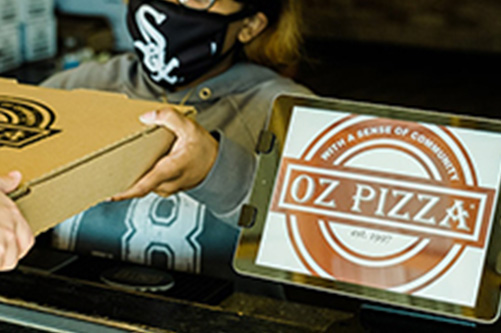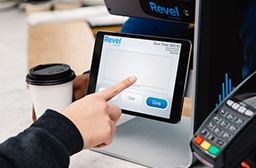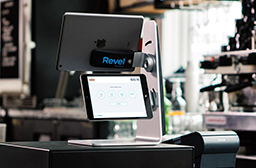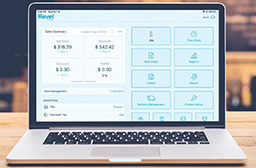Revel Systems is now part of Shift4 and this website will soon redirect to Shift4.com.
Call Sales: +1 (833) 437-3835
Revel’s Guide to Pizza
Revel’s Guide to Pizza will take you through an analysis of pizza business tactics, practical suggestions, and a look at the hottest trends in the industry.

Revel’s Guide to Pizza
In Revel’s Guide to Pizza we’ll explore five major factors to monitor for a thriving pizza business.
1. Evaluate What’s Working and the Areas for Improvement

While pizzerias are understandably driven out of a passion for the pies, it is important to analyze your business to get a full picture of the areas your business excels and those with room for improvement. Additionally, taking a look at your business will help you map out future goals! To get a full picture, you should:
Look at the Data
If you are questioning, what are we doing well, or what’s going wrong here? You should start by looking at your data. From sales reports and inventory reports to employee information and customer data; your data should be a close friend.
Review your sales information for trends. Identify your best-selling pies, and take a look at those that are not performing well. With robust reporting tools, you can analyze every item on your menu, see what sells and what doesn’t, and swap items in and out of your menu based on historical performance. Only selling one shrimp and pineapple pizza a week? As much as you love it, it may be time to take this tropical pie off the menu.
And if you don’t keep track of your data, well then it’s time to start thinking about investing in technology that tells you a story. See step two!
Listen to Your Customers
Are you using Yelp to take comments from your customers? (if not you should be!) Review sites are a valuable tool for feedback and gaining new customers. You should be regularly checking your feedback to compile comments and feedback. You can gain valuable and actionable feedback about your business. Diners can be your best advocate, and in the case there is room for improvement, a source for vocal criticism. Monitor your reviews and take action!
Talk to Your Team
Give your employees the opportunity to provide constructive feedback. Be it one on one meetings, a group conversation, or written surveys – your team may have suggestions for your business and feedback on why they love coming in every day!
2. Understand Costs and Investments

In step one we covered the importance of understanding your current performance. One area you must take a deep look at is your spend. From the necessities to the nice-to-haves, taking a look at your spend will help you identify places for improvement.
16% of your food ends up in the trash.
Inventory
Do you know what your weekly waste is? Do you consistently have inventory that gets thrown away or expires? The way to combat and keep up with your food waste is by consistently taking and reviewing inventory. Keeping up with your inventory has many benefits including enabling you to:
- Track Expected Use of Inventory
- Decrease Food Waste
- Prevent Over-Ordering
- Prevent Theft
- Check Your Financial Health
And help you answer questions like:
“So, how is the restaurant doing…financially?”
“Do we use the same amount of chicken in the summer as we do in the winter?”
“hmm…is someone stealing from us?”
“Do we really need to order more broccoli? I think we have enough for the next few days?”
By using an inventory management tool, you are able to take the guesswork out of the equation and replace it with data. With Revel, for example, you have the ability to track the sales of your pizza down to the ingredient level. So with every pizza sold, you know exactly how much cheese or how much meat was removed from your inventory – in real time. Advances in inventory management technology give operators the confidence to know that your kitchen will always be stocked with the right inventory levels.
Labor Costs
Restaurant labor costs are typically among highest costs of owning a restaurant, leading the list with rent. Restaurateurs commonly aim to keep labor costs between 20% and 30% of gross revenue. However, a full-service, white-tablecloth restaurant will likely have a higher labor cost percentage than a casual dining restaurant, since they employ more staff to provide a higher level of service. So how do you control restaurant labor costs?
Reduce Employee Turnover
Hold on to your great employees, first because they are valuable, but also because it costs far more to hire new employees than to hold onto, and keep your staff happy. An important factor in creating happy employees is to provide the right ongoing support. So offer proper onboarding, ongoing training, and advancement opportunities for your team.
Optimize Schedules
Labor scheduling, a challenging area for many restaurants – either you have too many employees scheduled or not enough staff to support a busy restaurant. Both scenarios can cost you big bucks.
So to reduce the negative impact that both over and understaffing can have for your business, use your business data to better understand and forecast your labor needs. With detailed sales and scheduling reports, you can keep an eye on the relationship between your sales and your employee costs.
Revel’s intuitive iPad POS System incorporates labor percentages based on the data you’ve entered and displays a color-coded report so you’ll always know just where you are in relationship to your goals. Take this data and apply it to your scheduling. Are your Fridays packed? Schedule an additional employee so you can provide the best service possible. Tuesday’s a little slow? Shift your schedule to reduce your headcount during your slowest hours.
Technology
Front of house and back of house technology are important to your business, and understanding the right technologies and their costs should be done early. But if you are newer to technology or relying on manual methods, it’s the perfect time to look into how technology can enhance your business.
Your POS, for example, is an important decision. Your business needs a POS that can handle the unique needs of a pizzeria, it should be capable of custom pizza orders, split bills, and keeping accurate reports of every action. Revel is unique in the ability it gives you to customize orders, create half and half pizzas, and seamlessly track your ingredient levels through integrated, real-time inventory management.
Additional technology to think about:
Self-Service Kiosks
Drive customer service with self-service. While this may sound counter-intuitive – customers’ are demanding total control over their customer experience, which creates an opportunity for bars to implement self-service kiosks. Let your customers create the perfect pizza, and they’ll keep coming back for more.
Online Ordering and Delivery
Pizza, the original delivery dish! Managing a delivery business takes investment and ongoing costs. Costs include additional staff and transportation or by partnering with a third party delivery service like UberEats or Postmates, a percentage of the profits. For many, the benefits out way the costs, but don’t forget to evaluate the numbers for yourself.
Updating Your Ovens
While a time-tested oven may give your pizzas the perfect flavor and color, if you are looking to speed up delivery time or produce more pizzas at a time – it may be time to update your ovens that can handle the needs of your business. From high powered and speedy to multi-leveled, check out the latest oven technology to find the right fit.
3. Creating a Standout Pizzeria!

If you take a look at the inner workings of your business and find that you need a little something extra to turn things around, check out some of these branding and marketing suggestions that can help make your pizzeria the talk to town.
Get Social
We mentioned earlier that you should be tuned into your reviews on sites like Yelp, but in today’s atmosphere, you should leverage social and review sites as a tool to engage current customers and connect with new ones.
With a new generation of young adults in the workplace, comes a new way of reaching your customers. Because Millennials and Gen X’ers grew up using social media, there is almost an expectation for restaurants to engage customers on social. Further, these folks are vocal across platforms – leaving reviews, posting photos, and checking into their favorite spots.
Your Restaurants’ Online Presence
Build a consistent experience across your social platforms. By adding high-quality photos to your Facebook, Instagram, and Yelp pages, you can put your best foot forward. Often, imagery is what sets one restaurant apart from another. An ooey-gooey, fresh slice will have future customers’ mouths watering to try!
Jumpstart Business with a Promotion
If social photos don’t seem to be enough to bring in new customers, try out check-in discounts to attract new customers. This is a great way to incentivize new customers to try out and then keep coming back for more! No doubt after they try your pies, they’ll be hooked.
Is Kitschy Decor for You?
Ready to take your brand a bit further? An increasingly popular trend in the industry is the uber-branded and kitschy ambiances that have become more prevalent restaurants across the country. Tiki bars, french coffee shops, and backyard BBQ joints have all launched with elaborate interiors to match the restaurant theme. Perfect for drawing in the social media obsessed millennial crowd, this may also be a perfect fit for pizzerias looking to pump up their social media appeal.
Whether you evoke the good old days with white and red checkered tablecloths, a jukebox, and mood lighting or go for a brick and industrial vibe that evokes Chicago – a cohesive brand story has become an increasingly important aspect of a restaurant’s popularity.
Fit Your Neighborhood
As you hone in your brand, remember you should also consider your location and location demographics to ensure your concept will resonate with the neighborhood. Whether your shop is doing $5 take-and-bake pizzas or gourmet pies, whole pizzas or by-the-slice offerings, a failure to recognize area demographics often makes it hard to survive. So be sure to take in things like average income, family size, and walkability into consideration as you brand your business.
Technology for the Future
Another way to set your restaurant apart is through the adoption of new technology. Customers are immersed in technology, and everything from smart home products to mobile phones and smart watches present an opportunity to reach customers and enable them to engage with your restaurant.
Beyond online and mobile ordering, the technology landscape is changing, and pizzerias are leading the way for restaurants!
For example, voice ordering is primed to become a big part of the customer experience. Ease of use for ordering will only become more important, and with technologies like Alexa and Google Home gaining popularity, it’s safe to say that we will see the adoption of voice-activated ordering in pizzerias to keep up with current technology.
Self-driving vehicles may make their way into the industry. A key partnership to watch is Domino’s and Ford, the companies are currently testing self-driving delivery vehicles. And if the pizzas aren’t autonomously driven, they could be flown to your front door… Explain? Domino’s partnered with Flirtey drone delivery service to test out a drone delivery program, and in 2016 a couple in Auckland became the first people to enjoy a flying pizza.
And pizzerias are even taking technology on the road. California based Zume Pizza uses robotics and artificial intelligence to make pizza en route. According to a report by Business Insider, Zume’s automated kitchen makes 370 pizzas an hour and can fill orders and deliver in 5 to 20 minutes.
4. Time to Plan for the Future

After you analyze your business through multiple lenses, you can begin to plan for the future – both immediate changes and long-term goals. Take your insights to create an actionable plan.
Did you learn that you are losing money on food waste? There are a couple things you can do! You can cut back on your inventory orders, cutting down on the amounts of produce. Or you might want to slim down your menu, stick with your best sellers and remove the recipes that are less popular.
Did you notice your opening hour is pretty slow? One idea is to push back your hours, open later and stay open later. You’ll maintain your loyal customers, and have the opportunity to market your pizzas to a later crowd.
These are changes that can have immediate impacts on a business and are relatively easy to implement. For larger changes that may take more of an investment, it is important to map out an implementation timeline. For example:
Goal: Redo restaurant decor
Timeline: In 2 months
Dependencies: Secure interior designer, loan for remodel
Create as detailed a plan as possible to keep yourself on the right track to achieve your goals. Whether instituting small changes or a major overhaul, you have the ability to learn from the past and grow into the pizzeria of your goals.
5. Case Study: Posh Tomato
 When thinking about innovation, branding, and creating a pizzeria that stands out from the crowd, take a look at how New York-based Posh Tomato built a unique chain of pizzerias.
When thinking about innovation, branding, and creating a pizzeria that stands out from the crowd, take a look at how New York-based Posh Tomato built a unique chain of pizzerias.
Rooted in a love for pizza, the successful franchise gained prominence by applying a series of principles to the business. The first and founding goal was to deliver the best upscale, fresh pizza experience around. From that belief came the institution of technology to make that goal achievable.
Creating a Unique Concept
With big competition in the neighborhood, Posh Tomato honed in on their brand and the business practices needed to give them a competitive edge. The first and most noticeable differentiator is the speed at which Posh Tomato delivers pizzas; through the use of electric brick ovens, Posh Tomato cooks their pizzas in under 3 minutes.
Posh Tomato also looked to a POS that could keep up and give a competitive edge. The pizza recipe alone was a home run; now they needed the right system to sell the product and help ease the management processes. They needed a POS system that could take the stress out of back-office work and help them run a smarter, faster, and more efficient business.
Posh Tomato COO, Solomon Sarway shares, “When we opened our first location we were one of five pizzerias in a two block radius on the avenue. We understood that we were offering a pizza 2.0 – a different product with a completely different experience,” so to complement the pizza, they decided to go with the cutting edge technology Revel offers.
Making Profit on Pies
The pizza and speed of service combined to be a hit! Posh Tomato has expanded beyond the first location to bring fresh, fast pizza to customers throughout the east coast. By creating a brand that is focused on delivering pizza to customers quickly coupled with providing an all-around experience, Posh Tomato capitalized on an untapped market.
To learn more about Revel Systems pizza capabilities, visit Pizza POS.



